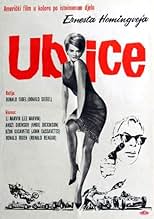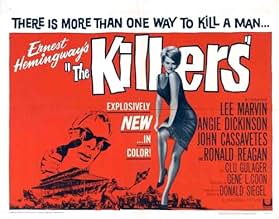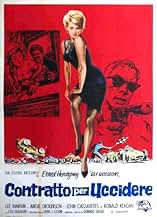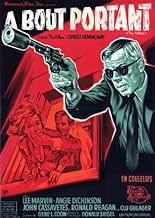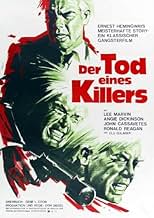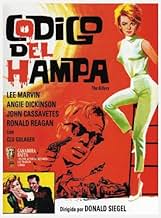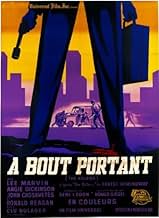VALUTAZIONE IMDb
7,0/10
10.090
LA TUA VALUTAZIONE
Sorpresi che la loro vittima non abbia cercato di scappare da loro, due sicari professionisti cercano di scoprire chi li ha assunti e perché.Sorpresi che la loro vittima non abbia cercato di scappare da loro, due sicari professionisti cercano di scoprire chi li ha assunti e perché.Sorpresi che la loro vittima non abbia cercato di scappare da loro, due sicari professionisti cercano di scoprire chi li ha assunti e perché.
- Regia
- Sceneggiatura
- Star
- Ha vinto 1 BAFTA Award
- 1 vittoria e 1 candidatura in totale
Irvin Mosley Jr.
- Mail Truck Guard
- (as Irvin Mosley)
Recensioni in evidenza
I recently saw this at the 2008 Palm Springs Film Noir Festival. Not really Film Noir as it was made after the genre had passed and is in color and features no detectives or private eyes and not even a film as it was originally intended as the very first made-for-television movie. Produced by Universal's Revue Studios it was deemed too violent for television. It of course isn't too violent by today's standards and NBC censors did call for revisions of the movie and since there are only a few questionable scenes It could have been easily done but they left it as was and it didn't make it's May of 1964 television premier. Instead it went to theaters and drive ins in July of 1964. Long-time film and television director Don Siegel directs. His most noted work would still come late in his career with Clint Eastwood in "Coogan's Bluff", "Two Mules for Sister Sara", "The Beguiled", "Dirty Harry" and "Escape From Acatraz" and John Wayne in "The Shootist" and Charles Bronson in "Telefon." This film is as different from the 1946 film as that film is as different from the short story by Earnest Hemingway that both film borrow from. The 1946 film is noted for being Burt Lancaster's first film role and the 1964 film is noted for being Ronald Reagan's last film role. Seasoned hit-man Charlie Storm (Lee Marvin) and young enforcer sidekick Lee (Clu Gulager) have been hired for larger than usual fee to knock off a retired professional race car driver who now teaches shop class in a school for the blind. A series of flashbacks tell the story of Johnny North (John Cassavetes) and his mechanic Earl Sylvester (Claude Akins) and the femme fatale Sheila Farr (Angie Dickenson) who comes into their lives. Sheila is the kept woman of mobster Jack Browning (Ronald Reagan) whose gang includes Mickey Farmer (Norma Fell) and George Flemming (Robert Phillips). Also in the cast are a couple of familiar and wonderful character television actors in small support roles with Kathleen O'Malley and Burt Mustin. Music score by John Williams when he was a contract composer before he made it big the film also features a Henry Mancini song "Too Little Time" with an on screen performance by jazz singer Nancy Wilson. Screenplay adaptation by Gene L. Cook and director Siegel this deserves a look especially from it's great cast and historical perspective. It keeps flowing pretty smoothly and never bogs down. Cassavetes seems uncomfortable in the role and their really isn't much on screen chemistry between he and Dickenson but Dickenson is delicious as the femme fatale and Marvin and Gulager, especially Gulager's smooth wit, are great as the hit team. Angie Dickenson was on hand at the screening for an audience Q&A following the film and it was great to see her. I liked this and would give this an 7.5 out of 10.
Under the title Ernest Hemingway's The Killers, Don Siegel's 1964 movie shows no more fidelity to the short story from which it takes its name and a fraction of its plot than Robert Siodmak's 1946 masterpiece, The Killers. And though it borrowed from the earlier movie its flashback structure (substantially simplified) and much of the backstory written for it, it's not quite a remake, either: the changes strike too deep.
A pair of contract hit-men track down a victim who seems ready, almost eager, to die. The killers this time around are Lee Marvin and Clu Gallagher, whose cozy arrangements suggest something of Fante and Mingo in The Big Combo. The first big shift from its 1946 predecessor is that Marvin's curiosity, not an insurance investigator's, sets the plot in motion, by his delving into the target's past and the whereabouts of a million dollars from a heist years before (in fact, he becomes the principal character). The second is a racheted-up level of violence: The movie opens with the pair tracking down their prey in a school for the blind, whose residents they ruthlessly terrorize during their hunt. And the level stays high.
John Cassavettes plays the victim, a former race-car driver fallen on hard times since a bad smash-up. Through the reminiscences of old buddy Claude Akins and past associate Norman Fell, we relive his racing career to an extent that stretches of the movie look like outtakes from Grand Prix. In those glory days he crossed tracks with the femme fatale of the piece, Angie Dickinson (in her rat-pack, late-Camelot salad days herself). After his car crash and their break-up, she lures him off the primrose path to serve as driver during a mail-truck robbery.
But Dickinson's heart belongs to daddy daddy in this instance being Ronald Reagan as a heavy. This marks his last film role. For a while it was chic to dismiss Reagan as a lousy actor, but he was always compentent enough. The puzzle is that the undeniable charisma that helped garner him the governorship of California and the presidency of the United States never came through on the screen; he couldn't carry a picture. He has a nasty moment slapping Dickinson silly when her attention strays to Cassavettes, but Marvin redeems his top billing by stealing the movie.
Ernest Hemingway's The Killers remains a good example of how the complexities and suggestiveness of the noir cycle were to metamorphose into a faster, flatter, more literal and brutal style of moviemaking starting in the late 1950s. Don Siegel was in the forefront of this change, starting in period noirs (The Verdict) but reaching his apogee, so to speak, in Dirty Harry. He delivers the goods, pronto, in a plain brown wrapper.
A pair of contract hit-men track down a victim who seems ready, almost eager, to die. The killers this time around are Lee Marvin and Clu Gallagher, whose cozy arrangements suggest something of Fante and Mingo in The Big Combo. The first big shift from its 1946 predecessor is that Marvin's curiosity, not an insurance investigator's, sets the plot in motion, by his delving into the target's past and the whereabouts of a million dollars from a heist years before (in fact, he becomes the principal character). The second is a racheted-up level of violence: The movie opens with the pair tracking down their prey in a school for the blind, whose residents they ruthlessly terrorize during their hunt. And the level stays high.
John Cassavettes plays the victim, a former race-car driver fallen on hard times since a bad smash-up. Through the reminiscences of old buddy Claude Akins and past associate Norman Fell, we relive his racing career to an extent that stretches of the movie look like outtakes from Grand Prix. In those glory days he crossed tracks with the femme fatale of the piece, Angie Dickinson (in her rat-pack, late-Camelot salad days herself). After his car crash and their break-up, she lures him off the primrose path to serve as driver during a mail-truck robbery.
But Dickinson's heart belongs to daddy daddy in this instance being Ronald Reagan as a heavy. This marks his last film role. For a while it was chic to dismiss Reagan as a lousy actor, but he was always compentent enough. The puzzle is that the undeniable charisma that helped garner him the governorship of California and the presidency of the United States never came through on the screen; he couldn't carry a picture. He has a nasty moment slapping Dickinson silly when her attention strays to Cassavettes, but Marvin redeems his top billing by stealing the movie.
Ernest Hemingway's The Killers remains a good example of how the complexities and suggestiveness of the noir cycle were to metamorphose into a faster, flatter, more literal and brutal style of moviemaking starting in the late 1950s. Don Siegel was in the forefront of this change, starting in period noirs (The Verdict) but reaching his apogee, so to speak, in Dirty Harry. He delivers the goods, pronto, in a plain brown wrapper.
Don Siegel's 'The Killers' is a diamond in the rough! Initially filmed for television, its technical limitations are easily overlooked as they are more than compensated for by the drive of the no-nonsense narrative, and the high standards of the acting. Caught somewhere between Kubrick's 'The Killing' and Boorman's 'Point Blank', it may not be as flamboyantly impressive as either, but it is just as memorable in its own low key way.
Quentin Tarantino has admitted that the structure of 'The Killing' has influenced him, but after watching 'The Killers', one must question whether this movie is also high on his list. Especially as the cooler-than-thou hit-men played by Lee Marvin and Clu Gulager almost anticipate Travolta and Jackson's similarly quirky ones in 'Pulp Fiction' thirty years later. Just like Vincent and Jules, Charlie and Lee are eccentric and likable when "off duty" and brutal sociopaths when on. Lee Marvin is one of Hollywood's legendary screen tough guys, and his performance here is as good as any he ever did, but the real stand out for me is Clu Gulager's health nut contract killer. He just about steals every scene he is in. Up to this point he was mainly known as a Western TV star. Why this role didn't launch him into a Bruce Dern/Harry Dean Stanton/Dick Miller style career baffles me. Instead he was mainly consigned to the "made for TV" wasteland, and never got the breaks his talent deserved.
Marvin and Gulager's star turns are backed up by strong supporting performances from John Cassavetes, as their enigmatic "job", Angie Dickinson, a double-crossing femme fatale, and Ronald Reagan in a surprising turn as a nasty gangster. Also keep an eye out for a dialogue-free cameo by a very young looking Seymour Cassel!
'The Killers' looks better and better as the years go by. Not without flaws, sure, and calling it a masterpiece would be overkill, but it's a movie that was ahead of it's time in many ways, and it can't help but impress discerning fans of 50s/60s b-grade crime movies, film noir, or Sam Fuller.
Quentin Tarantino has admitted that the structure of 'The Killing' has influenced him, but after watching 'The Killers', one must question whether this movie is also high on his list. Especially as the cooler-than-thou hit-men played by Lee Marvin and Clu Gulager almost anticipate Travolta and Jackson's similarly quirky ones in 'Pulp Fiction' thirty years later. Just like Vincent and Jules, Charlie and Lee are eccentric and likable when "off duty" and brutal sociopaths when on. Lee Marvin is one of Hollywood's legendary screen tough guys, and his performance here is as good as any he ever did, but the real stand out for me is Clu Gulager's health nut contract killer. He just about steals every scene he is in. Up to this point he was mainly known as a Western TV star. Why this role didn't launch him into a Bruce Dern/Harry Dean Stanton/Dick Miller style career baffles me. Instead he was mainly consigned to the "made for TV" wasteland, and never got the breaks his talent deserved.
Marvin and Gulager's star turns are backed up by strong supporting performances from John Cassavetes, as their enigmatic "job", Angie Dickinson, a double-crossing femme fatale, and Ronald Reagan in a surprising turn as a nasty gangster. Also keep an eye out for a dialogue-free cameo by a very young looking Seymour Cassel!
'The Killers' looks better and better as the years go by. Not without flaws, sure, and calling it a masterpiece would be overkill, but it's a movie that was ahead of it's time in many ways, and it can't help but impress discerning fans of 50s/60s b-grade crime movies, film noir, or Sam Fuller.
One of Hollywood's greater contract directors, Donald Siegel, brought Hemmingway's short story to TV, but NBC turned it down because, for 1964, it was too damn brutal. Although it pales in comparison to the 1946 original, this cheap (thanks to the gawd-awful production values of Universal in the sixties) remake holds it own.
When button-men Lee Marvin and Clu Gulager show up at a school for the blind to empty their silenced revolvers into former race-car driver John Cassavetes, they don't expect him to just stand there and take it. Marvin, exuding clean-smelling and lean menace and Gulager, a carrot-juice swilling sociopath travel cross-country in their search for Cassavetes' story. They find that the race driver, washed up after a near-fatal crash gains employment with mobster Ronald Reagan (I can just see Ronnie giving Gorbachev the same look at the 1986 summit that he gives Cassavetes when the driver challenges the mobster for control of Reagan's girl, Angie Dickinson). After lots of double-crosses and a fair amount of "why did he or she do that?," Marvin comes calling at Reagan's door.
Lee Marvin was excellent when portraying a killing machine and he holds the movie together. He and Gulager are there to punctuate the sometimes good and sometimes not-so-good flashbacks and they are suave and eerily debonair grim reapers. If anything, they're more interesting than the flashbacks; all good action flicks need good bad guys and Reagan looks too bored with the whole thing. Is it possible that, after seeing him so successful and upbeat for eight years in the White House, a grim and petty Reagan seems anachronistic? Yet, it really is Marvin who makes this movie rise above the cheap production values, the cheesy matte photography, and the canned John(ny) Williams score.
Marvin was about to begin a string of successes that would last into the early seventies. That voice is so distinctive! When he talked, he sounded, as another reviewer once said, "like a dinosaur growling." He is so evil and you can't stop liking him. Although Marvin and Robert DeNiro are completely different actors, they both have the same effect on me when they inhabit the screen--I stop doing everything else and just watch them. Pure charisma. When asked by David Letterman why he was so popular, Lee Marvin simply grinned and, with his index finger extended, growled, "Ratatatat!" Don Siegel would go on to make other tough movies; his style was clean, tough, and with just enough style to leave the audience with a satisfied taste in it's mouth. Under his direction, Clint Eastwood would establish himself as a superstar. One can only imagine how far Marvin would have gotten under the command of the button-man director!
When button-men Lee Marvin and Clu Gulager show up at a school for the blind to empty their silenced revolvers into former race-car driver John Cassavetes, they don't expect him to just stand there and take it. Marvin, exuding clean-smelling and lean menace and Gulager, a carrot-juice swilling sociopath travel cross-country in their search for Cassavetes' story. They find that the race driver, washed up after a near-fatal crash gains employment with mobster Ronald Reagan (I can just see Ronnie giving Gorbachev the same look at the 1986 summit that he gives Cassavetes when the driver challenges the mobster for control of Reagan's girl, Angie Dickinson). After lots of double-crosses and a fair amount of "why did he or she do that?," Marvin comes calling at Reagan's door.
Lee Marvin was excellent when portraying a killing machine and he holds the movie together. He and Gulager are there to punctuate the sometimes good and sometimes not-so-good flashbacks and they are suave and eerily debonair grim reapers. If anything, they're more interesting than the flashbacks; all good action flicks need good bad guys and Reagan looks too bored with the whole thing. Is it possible that, after seeing him so successful and upbeat for eight years in the White House, a grim and petty Reagan seems anachronistic? Yet, it really is Marvin who makes this movie rise above the cheap production values, the cheesy matte photography, and the canned John(ny) Williams score.
Marvin was about to begin a string of successes that would last into the early seventies. That voice is so distinctive! When he talked, he sounded, as another reviewer once said, "like a dinosaur growling." He is so evil and you can't stop liking him. Although Marvin and Robert DeNiro are completely different actors, they both have the same effect on me when they inhabit the screen--I stop doing everything else and just watch them. Pure charisma. When asked by David Letterman why he was so popular, Lee Marvin simply grinned and, with his index finger extended, growled, "Ratatatat!" Don Siegel would go on to make other tough movies; his style was clean, tough, and with just enough style to leave the audience with a satisfied taste in it's mouth. Under his direction, Clint Eastwood would establish himself as a superstar. One can only imagine how far Marvin would have gotten under the command of the button-man director!
The Killers is directed by Don Siegel and adapted to screenplay by Gene L. Coon from the short story written by Ernest Hemmingway. It stars Lee Marvin, Angie Dickinson, Clu Gulager, John Cassavetes, Ronald Reagan and Claude Akins. Music is by John Williams and cinematography by Richard L. Rawlings.
Hit men Charlie (Marvin) and Lee (Gulager) enter a school for the blind and gun down motor mechanic teacher Johnny North (Cassavetes). He doesn't resist. Why? This question bothers Charlie and he sets about finding out...
It's difficult when reading the name The Killers to not think of the 1946 film made by Robert Siodmak, a film that is revered as one of the quintessential movies of film noir. But Don Siegel's film, a re-jigging of the plot, is well worthy of consideration as quintessential neo-noir.
Originally slated to be the first made for TV movie as part of a new era for movies on television, the film was pulled by NBC for being too violent. With the film also featuring a murder by sniper scene, the recent assassination of John F. Kennedy by sniper ensured The Killers was temporarily on unsafe ground. With Ronald Reagan making his last appearance on film before moving into politics, unusually playing a villain no less, the 64 version of The Killers has a bit of history.
It's a film about double-crossing, murder and fateful yearnings, featuring amoral characters in a wonderfully constructed story that is told in flashbacks! Photographed in bright, almost garish, colours, it's very much the polar opposite to Siodmak's version, well visually at least, but it is very effective and striking, almost enhancing the lurid nature of Coon's screenplay. It's an aggressive film where the violence packs a punch, and the ending has a considerable black heart.
The cast are mostly effective. Marvin and Gulager's hit-man pairing are deliberately off kilter in terms of personality, and it's these two that propel the movie forward (well backwards really). Cassavetes makes interesting work as live wire dupe Johnny, Akins does good as a pal watching on helplessly as Johnny loses his life footings and Dickinson sizzles as she fatalises the femme. Weak link is Reagan, who looks ill at ease playing a tough villain type. It's no surprise to learn later on down the line that he wasn't very fond of the role.
Good quality neo-noir crafted by a man who knew how to do the real deal back in the day. 7.5/10
Hit men Charlie (Marvin) and Lee (Gulager) enter a school for the blind and gun down motor mechanic teacher Johnny North (Cassavetes). He doesn't resist. Why? This question bothers Charlie and he sets about finding out...
It's difficult when reading the name The Killers to not think of the 1946 film made by Robert Siodmak, a film that is revered as one of the quintessential movies of film noir. But Don Siegel's film, a re-jigging of the plot, is well worthy of consideration as quintessential neo-noir.
Originally slated to be the first made for TV movie as part of a new era for movies on television, the film was pulled by NBC for being too violent. With the film also featuring a murder by sniper scene, the recent assassination of John F. Kennedy by sniper ensured The Killers was temporarily on unsafe ground. With Ronald Reagan making his last appearance on film before moving into politics, unusually playing a villain no less, the 64 version of The Killers has a bit of history.
It's a film about double-crossing, murder and fateful yearnings, featuring amoral characters in a wonderfully constructed story that is told in flashbacks! Photographed in bright, almost garish, colours, it's very much the polar opposite to Siodmak's version, well visually at least, but it is very effective and striking, almost enhancing the lurid nature of Coon's screenplay. It's an aggressive film where the violence packs a punch, and the ending has a considerable black heart.
The cast are mostly effective. Marvin and Gulager's hit-man pairing are deliberately off kilter in terms of personality, and it's these two that propel the movie forward (well backwards really). Cassavetes makes interesting work as live wire dupe Johnny, Akins does good as a pal watching on helplessly as Johnny loses his life footings and Dickinson sizzles as she fatalises the femme. Weak link is Reagan, who looks ill at ease playing a tough villain type. It's no surprise to learn later on down the line that he wasn't very fond of the role.
Good quality neo-noir crafted by a man who knew how to do the real deal back in the day. 7.5/10
Lo sapevi?
- QuizAccording to Don Siegel, it was the policy at Universal at the time to shoot the last scene of the film first. On that first day of filming, according to Siegel and Clu Gulager, Lee Marvin arrived late and had been drinking, but because he had no dialogue, the scenes were used as shot.
- BlooperAt the start of the race, Johnny presses the accelerator to the floorboard with his right foot. However, his left foot is nowhere near the clutch. In a manual transmission, the clutch would need to be released while simultaneously accelerating.
- Citazioni
Charlie Strom: Lady, I don't have the time.
- Curiosità sui creditiThe style of the film's credits reflects its original made-for-TV origins: in 1960s TV movies, Stars, Co-stars, and Featured Players were listed only in the opening credits, while supporting players were listed only in the closing credits.
- ConnessioniFeatured in Biography: Angie Dickinson: Tinseltown's Classiest Broad (1999)
- Colonne sonoreToo Little Time
Music by Henry Mancini
Lyrics by Don Raye
Sung by Nancy Wilson
[Johnny and Sheila dance to the song performed at the nightclub]
I più visti
Accedi per valutare e creare un elenco di titoli salvati per ottenere consigli personalizzati
Dettagli
Botteghino
- Budget
- 750.000 USD (previsto)
- Lordo in tutto il mondo
- 9261 USD
- Tempo di esecuzione
- 1h 33min(93 min)
- Colore
- Proporzioni
- 1.85 : 1
Contribuisci a questa pagina
Suggerisci una modifica o aggiungi i contenuti mancanti


